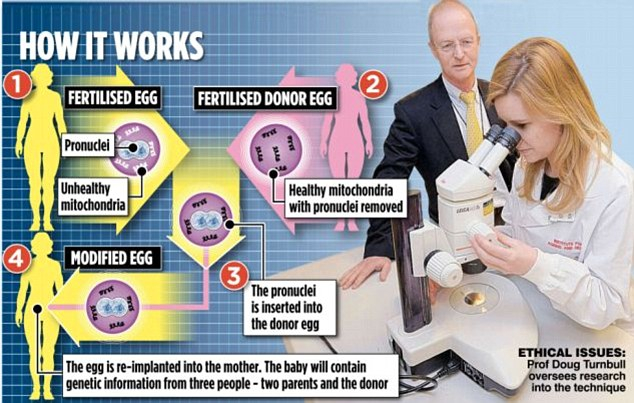
London: A British mother who is in line to be the first in the country to create a baby with three parents today appealed to lawmakers to change the law and allow her to give birth.
Vicky Holliday, 38, is reluctant to have a second child with her partner Keith Newell after their first — one-year-old Jessica Newell — was born with a devastating disease caused by faulty mitochondrial DNA.
Holliday is being treated by a British scientist who has spent 15 years developing a technique to use DNA from a second mother alongside her own nucleus and her partner’s sperm.
The result would be a baby free of the disease. It would take almost all its genetic characteristics from its mother and father but with extra material from a third parent that would then be passed to future generations, the Sunday Times reported.
Holliday’s appeal to MPs came ahead of a vote on Tuesday on whether to amend the Human Fertilisation and Embryology Act to make the method legal.
In her appeal, Holliday begged MPs to make Britain the first country to introduce legislation allowing the procedure.
“It’s a very exciting moment,” said Holliday, a management consultant in Buckinghamshire.
“It would mean so much to us to be able to have a healthy child.”
“If MPs vote to allow the treatment it will not only be fantastic for us but help so many others too.
“When you’re given the worst possible news it helps to have a little bit of hope,” she said.
Mitochondria are self- contained units within the cell that produce its energy and have many other vital functions, which include producing hormones and other essential compounds. Supporters say the amount of DNA they contain is so small that any alterations will have only a small impact on the child.
However, critics counter that this is unproven. The change is being opposed by the Church of England.
Jessica, Holliday’s first child had seemed normal when she was born in December 2013.
Although flawed mitochondrial DNA is passed down the mother’s side, her mother and grandmother were unaffected and there was no reason for anxiety.
However, it turned out that Jessica was among the roughly one in 5,000 British children who inherit mitochondrial disorders and at six months her development slowed. Then she started to regress.
It is not certain that this technique would be used for Holliday, who is being treated by Doug Turnbull, professor of neurology at Newcastle University. Another method involves implanting the nucleus from her egg into a donated egg before fertilisation, avoiding the need to throw away fused DNA.












